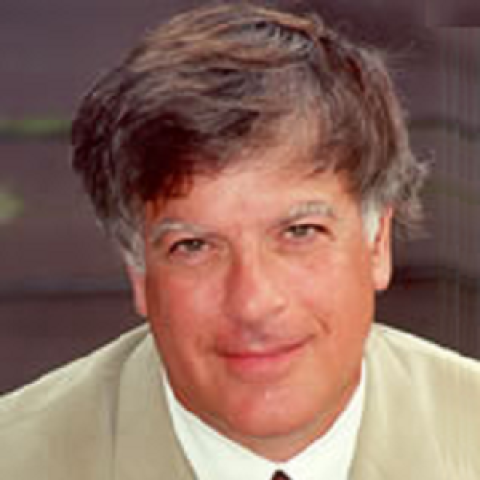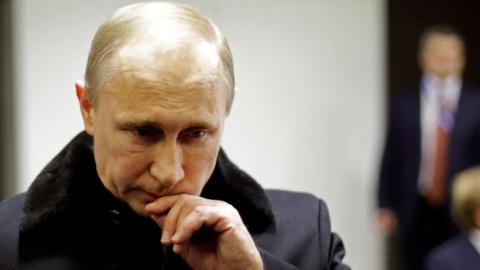The upsurge in fighting in Ukraine, with Russian troops and equipment pouring across the border, is a sign that Russian President Vladimir Putin has decided to engage the West in a dangerous game of “chicken,” the goal of which is to show that the only result of Western pressure on Russia will be renewed slaughter.
Given the objectives of the two sides, a renewal of the fighting was probably inevitable. Russia has fought from the beginning to remove the government in Kiev and prevent Ukraine from acceding to the European Union and NATO. For this purpose rebel control over one-third of the province of Donetsk, with millions of impoverished people and a dysfunctional economy, is clearly insufficient.
The timing of the surge in the fighting, however, in the middle of winter and after weeks of relative calm, is a reflection of a more general situation. The Putin regime needs an end to sanctions not because they are crippling in themselves but because in combination with the growing crisis of the economy and the unpredictable trajectory of the war, they could help lead to the destabilization of Russia.
The fear that pervades the Russian leadership is reflected in a series of recent statements by the country’s leaders. Prime Minister Dmitry Medvedev said on Jan. 27 that if Russia is cut off from the Swift international payment system as punishment for its actions in Ukraine, its response “will know no limits.” Andrei Kostin, the head of VTB, Russia’s second-largest bank, said excluding Russia from Swift would mean “war.” Igor Ivanov, the former foreign minister, said that a confrontation could involve nuclear weapons.
In fact, the Russian leaders now face a crisis of their own making. The steady rise in living standards during the 2000s, stemming from high prices for oil and gas, led to euphoria and an implicit deal between the authorities and the population according to which the authorities would be free to steal as long as the income of the population continued to rise. Living standards did rise but corruption crippled normal development. Now that oil prices have collapsed, Russia has no other comparable source of revenue and Western sanctions are preventing badly needed investment.
Under these circumstances, there is a serious danger of social tension. In Russia today, 110 persons, including Mr. Putin’s cronies, control 35% of the country’s wealth while 50% of adults have total household wealth of $871 or lower. In 2014, food prices rose 15.4%. It is a measure of the government’s concern that it has cut the price of vodka, despite the need to fill the treasury. This is a transparent attempt to use vodka to tranquilize the population.
If the economic situation in Russia continues to worsen, many Russians may come to see that the Ukrainian model of a peaceful and spontaneous rebellion against a corrupt regime can have relevance for them. It was because of the potential power of the Ukrainian example for Russia that Mr. Putin began the war in Ukraine in the first place.
The cost of the fighting has been hidden from Russians but, as the death rate climbs, the war may soon become less popular. The Russian authorities state officially that there are no Russian troops fighting in Ukraine but the movement of thousands of troops is impossible to hide and it is similarly impossible to hide soldiers’ funerals.
In St. Petersburg, calls are coming in to the hot line of the Soldiers’ Mothers organization from parents of soldiers who report anonymously that their children are being commanded to sign contracts that enable them to be sent to Ukraine. Such reports are also coming from a number of other regions.
Lev Shlosberg, the chairman of the Pskov regional division of the Yabloko political party, told Radio Liberty that there has been a change in the mood of the army because of the scale of the losses in Ukraine. He said that there have been massive cases of the canceling of contracts by contract soldiers and the termination of their military service because of an unwillingness to fight in Ukraine.
The military is carefully hiding the dispatch of forces from their places of permanent dislocation. If military planes once flew from the Pskov Airport, they now leave from the airport of the neighboring smaller city of Ostrov. Mr. Shlosberg and members of the press became aware of Russian military deaths in Ukraine by attending and reading about the funerals of soldiers from the 76th Airborne Division, which is based in Pskov. Now, there is an attempt to transport the bodies of those killed to unpopulated areas for funerals. But they are nonetheless seen and news of the high cost of the war is spreading.
The war in eastern Ukraine has been turned into a war of attrition in which the Ukrainian military is mostly holding its positions. Such a war could go on indefinitely. The Russians, however, have not used their air force and they have an estimated 52,000 troops just over the border from Ukraine. They could decide to begin an all-out offensive and drop any pretense of nonintervention. Such a course of action, however, carries risks for the Russians.
The pyramid of power in Russia is very unstable. Capital flight is reaching epic proportions ($63.7 billion in the first quarter of 2014, according to the U.S. State Department) and thousands of Russian officials have made contingency plans to escape with their money to the West.
Mr. Putin and his cronies will not take aggressive action if they fear that they could as a result lose their hold on power. This is why the time for maximum deterrence on the part of the West is now.















